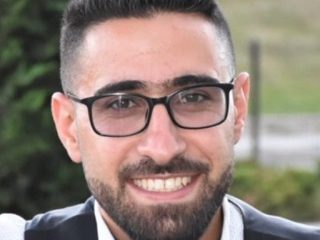Internet governance and digital transparency are buzzwords we hear so often; but what do they mean, and what’s at stake for European citizens? United Europe opened a discussion with a new cohort of young professionals and renowned experts in the field (please listen to highlists of the discussion in the podcast above).
The two-days-webinar, which took place on June 26 and July 3, brought together a cohort of 22 young professionals from all over Europe. Together they focused on issues affecting all Europeans – the digital response to Covid-19 pandemic and privacy rights of citizens. The group dived into Europe’s online regulations, new tracking apps, and privacy & transparency issues.
Europe’s Digital Sovereignty
“Should we put Europe on the Internet?” asked Viktor Mayer-Schönberger, Professor of Internet Governance and Regulation at the Oxford Internet Institute at Oxford University. The renowned expert in Internet Governance provoked a lively discussion with his opening impulse: Mayer-Schönberger has not answered the question. Instead he asked the participants whether Europeans should consider digital sovereignty, and if so, what should it represent?
“Do we need to make sure that European values are adequately represented,” he continued, “So that Europeans have a true choice on the Internet about the services and the products that are available?” The digital sovereignty of Europe can mean different things; most often, it refers to the users’ freedom to decide what data they want to share.
This freedom, however, is currently challenged and questioned by citizens as many governments introduce new apps to track people’s contacts and locations. These tools are often justified by the coronavirus risks. According to Mayer-Schönberger, the pandemic has brought to life an issue that has been overlooked for a long time, and that is the ownership of data, and our understanding of digital privacy.
“What is data, can it be owned legally, and what do our national legal systems say about that?” Mayer-Schönberger suggests we should pay more attention to relevant discussions about data in Brussels. Because, contrary to a popular opinion, “According to the EU legislators, there is no property in data.”
“The only way by which we can make sure that the data is not accessed by someone is through technical means, but not through legal means, and with a good reason,” he explained. During the webinar, the expert stressed on the rise of Covid-related apps that track and trace people’s whereabouts and inform those who have been around infected individuals. While Europeans often consider the data as something personal, this is not the case with these apps.“ Lawyers tell us that the data is like air; it’s common, and it’s collected in society,” Mayer-Schönberger said. “The question of appropriating data is currently being answered in the negative, but it does not mean we should not consider it. Maybe, we should create property rights for it,” he concluded.
Our Digital Replica: A Controversial Twin
The debate over privacy, ownership, and digital rights received new angles during the talk by Denise Feldner. A lawyer passionate about digital technology, she specializes in Internet Governance and Artificial Intelligence. In her talk, she focused on the “controversial twin”: the data that individuals share about themselves and that creates a virtual double.
This digital replica includes the info on our behavior, movements, and activities. Yet, its use is limited because not all of our data represents us correctly, and not everything shared defines us. In her talk, Feldner shows that the flow of personal data and its usage by others is a big dilemma. Not only cybersecurity risks, but also ethics and issues of openness and trust.
“Democratic Internet Governance is about managing data and setting up a system to collect it,” Feldner said, “The governments have to change how they act and set up rules for society. They have to be more transparent, and they are not used to this.”
Feldner highlighted the different approaches seen across the EU in regards to their citizens’ data. She shared her experience working with the German government for several months during the Covid crisis.
“It is always a matter of trust in the system, and the trust of the citizens in their governments,” she explained and said that in Germany, it took months to determine how to work with citizens’ data and process it for battling the pandemic. A similar process took around two days in Estonia, Feldner pointed out.
Open Government and Open Access
“The current pandemic is going to reshape and reframe the way governments look into their data, and there is already some change to that,” said Veronica Cretu, Governance Lead and an Envoy to Open Government Partnership (OGP).
Cretu is passionate about citizen engagement, open government, and open data, and she explained how these two are crucial in the current context for citizens in Europe and beyond. OGP, as she explains, is an initiative of nearly 80 governments across the globe that promote accountability, transparency, access, and inclusive governance. States and localities from all over the world can join the movement if they commit to these principles and encourage citizen participation, use new technologies for anti-corruption practices, and make more data open.
“The pandemic will position data on a new level so it will become the fuel or oxygen for decision-makers,” Cretu explained. “They will understand that the lives and safety of their citizens depend on data they use and collect.” According to the expert, the good governance depends on smart practices and inclusive access to information that highlights public spending, healthcare preparedness, and other topics which are increasingly relevant. She believes that the need for a better data will incentivize more investment into open government initiatives.
Cretu shared her experience working on open government issues with the participants; she highlighted that this is an initiative focused on the people, and for the people. According to that, the governments commit to sharing more information with the public, and making themselves more accountable, transparent, and inclusive. While some countries follow these goals, others do not.
“The governments are not always committed to disclose data in a format that is usable,” Cretu said. “Yet, without access to accurate information, you cannot make informed decisions.” The latter is proven with the many inconsistencies by different European countries when handling the pandemic. Often, it was a result of poor data management and lack of openness.
“The governments have to be front-runners of educating and training the citizens and ensuring that they are part of these learning processes along the way,” Cretu stressed. This means more accessible platforms for cooperation between large organizations, state institutions, and individuals.
One World – One Internet
One of such organizations, which focuses on accessible Internet for all, is ICANN, or the Internet Corporation for Assigned Names and Numbers. Laurent Ferrali, who serves as a Government and IGO Engagement Director, explained that ICANN is a global organization with a presence across the world, that is independent from interference of different governments. It is responsible for coordinating IP addresses and the Domain Name System on the Internet, which basically means it oversees the addresses people use to access websites.
”We are committed to “one Internet – one world” principle,” Ferrali stated. “However, it proves challenging because many governments are trying to address content issues by having new technical standards and undermining the idea of a global network.” He stressed that there is an issue of technical fragmentation of the Internet where different countries adopt new standards and create their digital bubbles.
“The technical fragmentation is a big issue because we are focused on keeping the Internet stable, open, secure, and interoperable,” Ferrali continued. At the same time, his organization does not participate in content discussions leaving that to individual governments. In countries like China and Russia, for example, the state has decided to have its own alternative to the global Internet where the governments have more control over the content the users can access.
“Such a solution is easy to introduce but we don’t agree with it,” said Ferrali, “The world cannot afford it.” He pointed out potential risks of domestic Internets in different countries such as a negative impact on the digital economy, or the fact that it would be impossible to have an inclusive dialogue with different stakeholders.
While ICANN manages around four billion network addresses in the world, the freedom of Internet and the digital rights of the citizens depend largely on the rules and regulations the governments impose. Even if they declare their commitment to transparency and accessibility, the recent events have shown that there are many flaws in the way states manage citizen data and use technology for the common good.
Although Europe remains a relatively free region in digital terms, the webinar showcased the need for better communication between citizens and governments, and the controversy that exists across different countries when it comes to Internet regulation.
Participants’ Highlights
 Rea Bitri, Albania
Rea Bitri, Albania
United Europe’s Young Professional Seminar was unique of its kind. First, the purity and clearance of our discussions made it possible to share ideas and experiences from our countries’ new rules and regulations due to the Covid-19 pandemic. The concerns of Europe’s digital future and human rights bind us together in a professional panel that enabled us not to be afraid to examine the reality of what is occurring in Europe today, aiming to find solutions and analyze methods applied from governments.
Secondly, United Europe is open to listen and act in a proportional way with what is missing in Europe today and care about people, especially youths, pay attention to them and consider the issues they raise. It is one of those rare organizations that exist to make a real change.
To me, the participation in the Young Professional Seminar was the highest call of duty to contribute and analyze new digital – regulations that Europe is about to apply for years to come. As citizens of this great continent, it is our responsibility to fight for human dignity. After this experience, I feel more confident and strong to protect what is right for my country, Albania, and choose what is best for Europe.
I appreciate all the work done for making this seminar happen, as I enjoyed every moment of meetings learning from the best and engaging in discussion with a diversity of people from all over the world chosen carefully for this professional seminar. I am willing and motivated to participate in more activities from United Europe, to be exposed to authentic discussions looking for solutions to create positive changes in our big community.
 Stelios Kavvadias, Greece
Stelios Kavvadias, Greece
The webinar provided a closer look to real world matters that were introduced by speakers with deep knowledge. In fact, they also sparked my interest about researching some topics in an academic context.
Oliver Behr, Germany
During the Young Professional Seminar on Internet Governance, I was greatly inspired by the diverse set of participants from all over Europe, with very different professional backgrounds. Everyone was striving to find solutions, instead of focusing only on the problem, and therefore, fruitful discussions emerged. I am looking forward to continuing on this topic, in collaboration with United Europe, and its staff.
 Yanina Korniienko, Ukraine
Yanina Korniienko, Ukraine
Thank you for the webinar. It was super interesting and useful. For me as a journalist, open government, access to information,and freedom of information are extremely important topics. In Ukraine, we have several open government projects, and the most famous one is ProZorro. It is a public procurement system and a symbol of dramatic reforms. ProZorro is the result of cooperation between the Ukrainian government, business, and civil society, and it was developed by Transparency International Ukraine with the help of volunteers, NGOs, and businesses. This is really helpful for journalists even though sometimes we have communication problems with the government mostly because of bureaucracy. The projects like ProZorro make me feel like we are on the way for a completely transparent communication with the government, which, hopefully, will be pretty soon. Can’t wait for this time!
 Mujib Shams, Turkey
Mujib Shams, Turkey
The two sessions covered lots of interesting topics such as Internet governance, open government, digital twins, security and privacy issues during the Covid-19 pandemic. The sessions were very interactive, the speakers covered almost every dimension of their respective topics, the moderator kept the seminar alive and read the questions and comments without any hesitation, and the participants took active part in the discussion and spoke their minds freely.
The outcome of the seminar for me was to get more familiar with the topics and hear what other people have experienced in their societies regarding how their governments responded to the pandemic and what security and privacy issues were raised and handled. The most important outcome is the chance to get to know this awesome group of people and be a part of this amazing event.
Alexander Galt, The Netherlands:
The United Europe Seminar on Internet Governance hosted a fantastic panel of speakers, enabling exclusive access to discuss issues and pose questions to learned experts ranging from the topics of digital sovereignty, regulation and global competitiveness to data infrastructure, digital literacy and open standards. Throughout the discussion with attendees there was a real diversity of thought and inquiry highlighting the range of academic, industrial and cultural experiences that everyone brought to the table.
My highlight was meeting Prof Viktor Mayer-Schönberger – having studied and cited his work in my postgraduate research – who posed some thought provoking points in how we should view the governance of innovation; either as engineering (with hard governance processes) or as gardening (with soft governance processes). Personally gardening speaks to my affinity with civil society and the ability of individual citizens to influence policy – however this is often at odds with the power asymmetries at play with big-tech in which hard governance (legislation and regulation) may be the only option.
We are still figuring out our relationship with digital technologies, both on an individual level and as a society, in which open and honest discussions like we had in the seminar are essential to sharing ideas and building towards a consensus.
I’d like to thank Sabine and Anna from United Europe for organising this seminar and look forward to collaborating with them and the United Europe network in the future.
 Elena Cecconi, Italy
Elena Cecconi, Italy
The Coronavirus pandemic changed not only the way we work, we study and our daily routines, but also keeps challenging us on a broader level. As it came out during the Young Professional Seminar, Internet Governance and Open Democracies have been strongly impacted during this time, whether it was for “new purposes” introduced due to the situation, or for innovations for a better digital sovereignty.
The speakers had all an excellent professional background and quickly the world we live in is changing and how each country is setting its own digital priorities.
What’s interesting in my opinion is that, while the urgency of new tracking apps for Covid-19 has been at the centre for months, the need for a data protection regulator becomes increasingly important. Cybersecurity, transparency and sustainable policies are currently being discussed, but the reality is that a democratic Internet Governance should have been at the top of the list for every single country (EU and non-EU), for global and local emergencies.
Joёl Christoph, Spain
New technologies engender new questions, particularly relating to access, efficiency, privacy and security. As our reliance on the internet grows by the day, it urges us to consider the present and future challenges and governance of the internet. This seminar connected diverse stakeholders to examine these issues, the ongoing transformation of how we work, consume and communicate, and what the way ahead may or may not look like for citizens, governments and tech companies.


